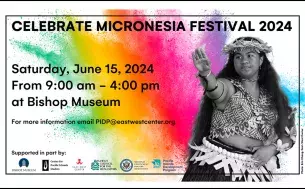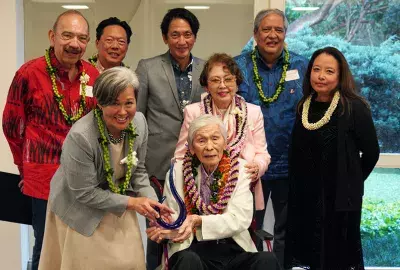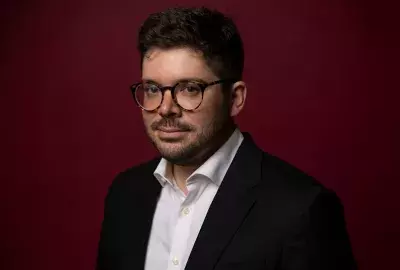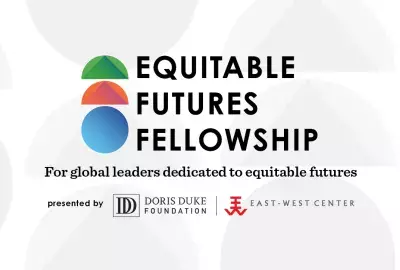Error message

OFFICE/DEPARTMENT
US $4 Million Awarded to EWC and University of Montana to Resume Youth Leadership Program in Environmental Issues
HONOLULU (June 1, 2022) – The East-West Center last month welcomed its first group of international exchange participants to the institution’s Honolulu campus after more than two years of pandemic lockdown, thanks to more than $4 million from the US Department of State in a joint award with the University of Montana. (View a photo gallery of the group’s activities.)
The 21 undergraduates and recent graduates were selected from tens of thousands of applications received by US Embassies in Southeast Asia for the East-West Center’s Academic Fellowship in Environmental Issues, part of the Young Southeast Asian Leaders Initiative —or YSEALI. The participants hail from Cambodia, Indonesia, Laos, Malaysia, Myanmar, Vietnam, Thailand, the Philippines and Timor-Leste. Their impressive accomplishments range from satellite-tagging manta rays in the Coral Triangle to training farmers in compromised lands of Sumatra and moving homes to off-grid solar energy in Timor-Leste.
Initially selected to for the YSEALI Fellowship slated for March 2020, the group was instead forced by the pandemic to participate virtually before finally being able to make the trip to Hawai‘i. Over the two years of postponement, EWC staff co-developed virtual programs with the fellows that could serve their struggling communities. These programs reached several hundred beneficiaries and resulted in the Center’s first environmental awards program, virtual boot camps for startups addressing fresh water and ocean issues, and a competition on circular plastics.
“The participants’ incredible dedication to pursuing their learning goals despite their hardship and disappointment has been inspiring,” said EWC program lead Lance Boyd. “The resumption of in-person programming for our only youth-focused professional development program for the entire Indo-Pacific is also of tremendous importance. As we look to strengthen our focus on training emerging leaders capable of addressing environmental issues and climate change, this program represents an excellent opportunity for growth and increased impact for the Center.”
Their two-and-half week capstone program was a combination of workshops by EWC researchers, site visits, community service, dialogues with local leaders like state Sen Chris Lee, and book discussions where participants are exposed to issues related to the environment, such as climate change, renewable energy, ocean protection, illegal and unreported fishing, pollution, disaster management, sustainable development and agriculture, food security, and water access.
About the program:
The YSEALI Academic Fellowship on Environmental Issues at the East-West Center allows fellows to use experiential learning techniques to expose participants to current themes in the environmental field, including climate change, sustainable development/sustainable agricultural practices, food security, ecotourism, renewable energy generation, and water management and treatment and explore environmental issues in the context of a globalized society, and draw comparisons between the United States and the participants’ home countries.
The Center is one of many implementation partners offering academic fellowships, professional fellowships, regional workshops, a small grants competition, and professional development under YSEALI. To join the initiative you only need to sign up online, which over 150,000 Southeast Asian youth have already done to express their interest in these opportunities. Through 2023, the East-West Center will offer six back-to-back fellowships with program partners University of California at Berkeley and the Yosemite Leadership Program at University of California at Merced.
US $4 Million Awarded to EWC and University of Montana to Resume Youth Leadership Program in Environmental Issues
HONOLULU (June 1, 2022) – The East-West Center last month welcomed its first group of international exchange participants to the institution’s Honolulu campus after more than two years of pandemic lockdown, thanks to more than $4 million from the US Department of State in a joint award with the University of Montana. (View a photo gallery of the group’s activities.)
The 21 undergraduates and recent graduates were selected from tens of thousands of applications received by US Embassies in Southeast Asia for the East-West Center’s Academic Fellowship in Environmental Issues, part of the Young Southeast Asian Leaders Initiative —or YSEALI. The participants hail from Cambodia, Indonesia, Laos, Malaysia, Myanmar, Vietnam, Thailand, the Philippines and Timor-Leste. Their impressive accomplishments range from satellite-tagging manta rays in the Coral Triangle to training farmers in compromised lands of Sumatra and moving homes to off-grid solar energy in Timor-Leste.
Initially selected to for the YSEALI Fellowship slated for March 2020, the group was instead forced by the pandemic to participate virtually before finally being able to make the trip to Hawai‘i. Over the two years of postponement, EWC staff co-developed virtual programs with the fellows that could serve their struggling communities. These programs reached several hundred beneficiaries and resulted in the Center’s first environmental awards program, virtual boot camps for startups addressing fresh water and ocean issues, and a competition on circular plastics.
“The participants’ incredible dedication to pursuing their learning goals despite their hardship and disappointment has been inspiring,” said EWC program lead Lance Boyd. “The resumption of in-person programming for our only youth-focused professional development program for the entire Indo-Pacific is also of tremendous importance. As we look to strengthen our focus on training emerging leaders capable of addressing environmental issues and climate change, this program represents an excellent opportunity for growth and increased impact for the Center.”
Their two-and-half week capstone program was a combination of workshops by EWC researchers, site visits, community service, dialogues with local leaders like state Sen Chris Lee, and book discussions where participants are exposed to issues related to the environment, such as climate change, renewable energy, ocean protection, illegal and unreported fishing, pollution, disaster management, sustainable development and agriculture, food security, and water access.
About the program:
The YSEALI Academic Fellowship on Environmental Issues at the East-West Center allows fellows to use experiential learning techniques to expose participants to current themes in the environmental field, including climate change, sustainable development/sustainable agricultural practices, food security, ecotourism, renewable energy generation, and water management and treatment and explore environmental issues in the context of a globalized society, and draw comparisons between the United States and the participants’ home countries.
The Center is one of many implementation partners offering academic fellowships, professional fellowships, regional workshops, a small grants competition, and professional development under YSEALI. To join the initiative you only need to sign up online, which over 150,000 Southeast Asian youth have already done to express their interest in these opportunities. Through 2023, the East-West Center will offer six back-to-back fellowships with program partners University of California at Berkeley and the Yosemite Leadership Program at University of California at Merced.







